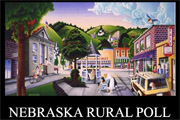Agricultural Economics, Department of

Nebraska Rural Poll
Date of this Version
10-2023
Document Type
Report
Citation
Nebraska Rural Poll Research Report 23-2, October 2023
Institute of Agriculture and Natural Resources, University of Nebraska-Lincoln
Abstract
Rural Nebraskans are more positive about the current change in their communities this year but are less positive about its future. Starting two years ago, the proportion believing their community changed for the worse was more than the proportion believing it had changed for the better (similar to what occurred in 2003 and 2009). However, this year that trend reversed back to the typical pattern. This year, more believe their community has changed for the better than has changed for the worse. When asked about what they expect ten years from now, this year more people believe their community will be a worse place to live ten years from now than a better place, only occurring one other time in 2011.
Despite that, rural Nebraskans are positive about their community by many different measures. Most rural Nebraskans rate their community favorably on its social dimensions, as friendly, trusting and supportive. Most rural Nebraskans also say it would be difficult to leave their community and have a positive attachment to their community. Finally, most rural Nebraskans disagree that their community is powerless to control its future.
Differences in perceptions of their community are evident by community size. Persons living in or near larger communities are more likely than persons living in or near smaller communities to get what they need in their community. However, persons living in or near the smallest communities are more likely than persons living in or near larger communities to have an attachment to their community.
Rural Nebraskans see much division over politics and think it is a serious problem. Most rural Nebraskans believe the lack of civil or respectful discourse in our political system is either a very serious or a somewhat serious problem. And most rural Nebraskans think Americans are more divided over politics than they were 10 years ago.
Rural Nebraskans have more faith in local community leaders and state political leaders than national political leaders to overcome differences to get things done. Two-thirds believe local community leaders do at least moderately well at overcoming differences to get things done. However, four in ten believe the same about Nebraska’s political leaders and only nine percent say America’s political leaders do at least moderately well at that. Outside of leadership, most also believe people in their local community do at least moderately well at overcoming differences to get things done.
Most rural Nebraskans have a negative opinion about social media and its impact on civil discourse. Most rural Nebraskans disagree that social media are a place for civil and productive discourse. And most agree it only reinforces what the user already believes and that they contribute to division in their community. Furthermore, more disagree that social media help them feel engaged in their community than agree.
While it wasn’t a widespread opinion, more rural Nebraskans disagree than agree that people in their community are respectful towards others with differing political views.
Rural Nebraskans tend to use many different forms of media. Most rural Nebraskans use the following media at least sometimes: read newspapers (online or in print), listen to news on the radio, get news from a website or app, and watch local television news. Most rural Nebraskans say they never or hardly ever watch either national evening network television news or cable television news.
Included in
Agribusiness Commons, Agricultural and Resource Economics Commons, Civic and Community Engagement Commons, Community-Based Research Commons, Demography, Population, and Ecology Commons, Entrepreneurial and Small Business Operations Commons, Place and Environment Commons, Public Affairs, Public Policy and Public Administration Commons, Regional Economics Commons, Rural Sociology Commons

